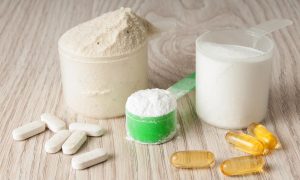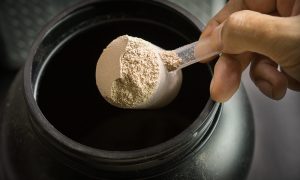Whey Protein VS Soy Protein

|
|
As far as sports and health supplements are concerned, we simply cannot argue that the sports supplement industry is worth some seriously big money these days. Pick up any health and fitness magazine and there is literally a sports supplement ad on every other page of the magazine, meaning that 50% of the magazine is basically one big sports supplement product advertisement. As far as effectiveness and popularity are concerned, protein powders rule the roost, and have done for some time now. In fact, protein powders are now so popular and beneficial, that there are dozens upon dozens of different varieties. The most common and popular form of protein supplement is whey protein, in fact it is the most popular sports supplement in the entire world. Soy protein however, is gradually becoming more and more popular and is actually beginning to look set to give whey protein a real run for its money. Protein is a macronutrient that is vital for cellular and muscular growth and repair. Simply put, without protein, we wouldn’t build muscle, our muscles wouldn’t repair themselves, and our cells wouldn’t function or regenerate properly either. Here we’ll be looking at and comparing the two in a great deal of detail, weighing up the various pros and cons of both supplement.
Whey protein
We’ll begin by taking a look at whey protein, the most popular sports supplement in the world. Whey protein is basically a by-product from milk, as it is left behind when milk is turned into cheese. As it provides all essential amino acids that the body requires, it is considered a complete protein source. Whey protein comes in a number of different forms though the most common form is powdered. The whey is dried, filtered, and powdered where it is then combined with vitamins, minerals, flavourings, and other nutrients depending on the actual product itself. Whey protein is a fast absorbing and fast digesting protein, making it ideal for post-workout nutrition as that is when the muscles are most anabolically primed for optimal nutrient absorption.
Benefits of whey protein

Some of the benefits of whey protein include the following:
• It’s a complete protein source
• It is fast digesting
• It is fast absorbing
• Promotes muscle growth and repair
• Convenient and easy to mix
• Can be used in cooking
• Tastes nice
• Can boost metabolism
• Can increase athletic performance
Possible downsides of whey protein
Just as there is good, there is also bad and for that reason here’s a look at the possible downsides of whey:
• Not suitable for prolonged nutrient release due to its fast absorption rate
• Can be expensive
• Some blends are less effective than others
• Not suitable for vegans or people sensitive to dairy
Soy protein
This plant-based protein is derived from soy beans. Soybeans contain no bad cholesterol and are naturally low in fat. Soy protein is ideal for people who cannot consume whey protein or animal based proteins and it too has been found to have a number of health benefits on the body.
Benefits of soy protein
Some of the more prominent benefits of soy protein include the following:
• Promotes muscle growth and repair
• Vegan and vegetarian friendly
• Rich in isoflavones which can prevent cancer
• Helps regulate blood sugar levels
• Lowers bad cholesterol
• Rich in fiber
• Rich in minerals
Disadvantages of soy protein
Here are some not so desirable things about soy protein:
• Can promote increases in estrogen (which slows metabolism and hinders muscle growth)
• Doesn’t tend to taste as nice
• Slow absorption rate












